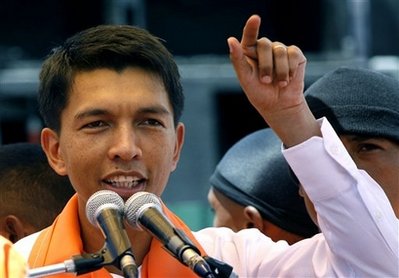Madagascar's Rajoelina is inaugurated as self-declared president
 Antananarivo - Madagascar's new leader Andry Rajoelina was inaugurated as president Saturday at a stadium ceremony attended by some 50,000 cheering supporters in the capital, Antananarivo.
Antananarivo - Madagascar's new leader Andry Rajoelina was inaugurated as president Saturday at a stadium ceremony attended by some 50,000 cheering supporters in the capital, Antananarivo.
The ceremony, following seven weeks of violence which saw the ousting of elected president Marc Ravalomanana, came a day after the African Union suspended the country over Rajoelina's "coup".
AU Peace and Security Council Chairman Bruno Nongoma Zidouemba had rejected Rajoelina's army-backed arrival to power through the streets, which he said could be considered tantamount to a "coup".
Ravalomanana resigned as president on Tuesday, handing over power to the military, who then gave it to Rajoelina, who was confirmed as interim president by the country's top court a day later.
Zidouemba said Madagascar had six months to organize elections or face sanctions on its leaders. Rajoelina, the former mayor of the capital Antananarivo, has given himself two years to hold elections.
The AU suspension came as a a growing number of countries vowed not to recognize Rajoelina's leadership.
The Southern African Development Community, the 15-country regional economic grouping of which Madagascar is a member, said Rajoelina's "illegal ousting of the democratically-elected president" was "unconstitutional" and refused to recognize it.
South Africa's Defence Minister Charles Nqakula has said the SADC would meet later this month to discuss sanctions, even as executive secretary Tomaz Salamao led a team to Madagascar for talks with the new leadership.
The United States said Thursday it was reviewing relations with Madagascar following the "undemocratic" transfer of power.
Germany also denounced the handover and called for a return to democracy on the island while South Africa's Foreign Minister Nkosazana Dlamini-Zuma said: "We don't support those who take power through unconstitutional means... so we will not recognize this government."
Rajoelina swept to power this week after the army leadership took his side in his two-month power struggle with Ravalomanana, whom the opposition accused of authoritarianism and misuse of public funds.
Over 100 people were killed in near-daily street protests, which brought the economy of the impoverished island of around 20 million people to its knees.
Ravalomanana, who was re-elected to a second five-year term in 2006, lost support over use of lethal force on protestors. His whereabouts are unknown. (dpa)